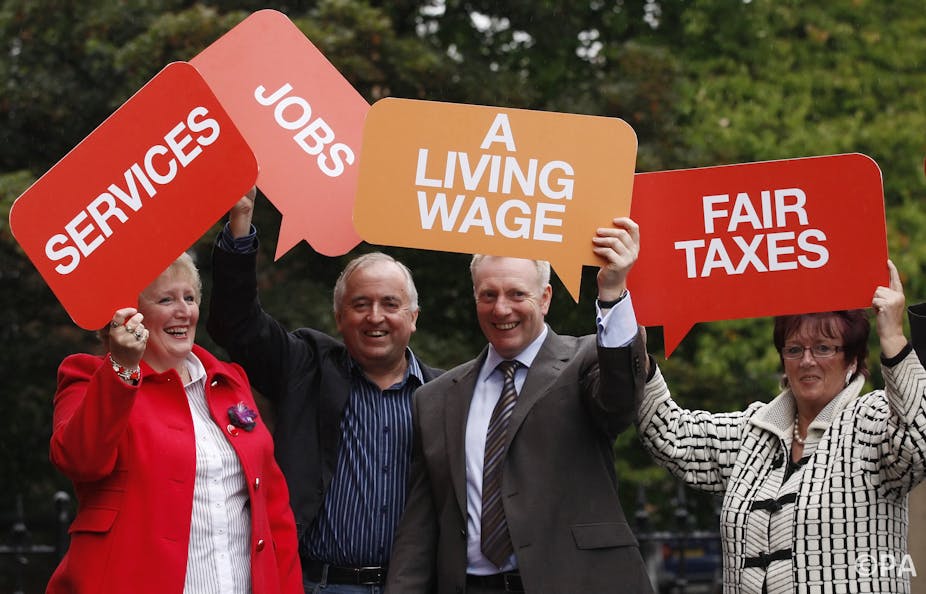From the way Ed Miliband’s recent turn on the campaign trail in Scotland was reported, you might think that his chosen theme of social justice has just suddenly appeared in the independence debate, just another rhetorical weapon to be deployed as the vote draws near.
Many reports have focused on Miliband’s assertion that the best way to guarantee social justice is to vote “No” because “a Labour government is on the way, a Labour government with genuine proposals for social justice.”
The truth is that Miliband is rather late to the party. Not only has the idea of social justice been deployed regularly throughout the referendum campaign, but ever since the advent of devolution in 1999, there have also been repeated claims by numerous politicians from different parties that their agendas and commitments indicate a strong commitment to social justice.
This is all well and good, if perhaps unsurprising – who, after all, would come out against social justice? But the problem is that there’s precious little clarity about what “social justice” actually means in today’s politics – and its taken-for-granted status means it’s rarely subject to any real interrogation.
Skirting the issue
Labour, the SNP, the Liberal Democrats and even the Tories all profess to be supporters of “social justice” – the Tories not least through Iain Duncan Smith’s Centre for Social Justice, which purports to be “an independent think-tank, established to put social justice at the heart of British politics.”
This superficial consensus is possible precisely because social justice has become a vacuous buzzword, so endlessly flexible that it’s now of hardly any practical use. Take any recent UK government as well as the Scottish government and you don’t have to look far to find a claim that x or y policy is “social justice-inspired” or “-informed”.
This has largely held true in the referendum campaign. The main constitutional question aside, there is little obvious daylight between the SNP, Labour and perhaps even Tory visions of what social justice would mean for Scotland and how it can be achieved. On all sides the idea seems to be that it will somehow be guaranteed by healthier economic growth, enhanced competitiveness and so on.
This sounds a lot like New Labour’s much-vaunted and widely criticised “Third Way”, with its emphasis on competition and “cohesion”. Indeed, the SNP’s professed vision is almost a Scottish version of Third Way politics, with the same theme of a national collective solidarity built on global competitiveness – and, just as with New Labour, the Yes campaign has hardly explained what social justice would look like at all.
Nation and territory
That partly reflects how, in Scottish politics, social justice has generally taken a back seat to another form of justice: territorial or even national justice, justice for “Scotland”, for “the nation”, for the imagined national collective. If we achieve territorial justice, so this argument goes, we will by definition find ourselves at our goal of social justice too.
This is not new. Demands for devolution were always demands for territorial justice of some kind; today’s demands for more and more devolution (Devo Max) or for full independence are similarly demands for more territorial justice, increasingly badged and branded as “national”.
The idea of a “democratic deficit”: that Scotland has been the loser in decades of UK government policy, plays to this idea. In the hands of the SNP and the Yes campaign, much of the point of independence is to make the nation “equal, fair and kind,” as Alex Salmond expressed it in 2011
Miliband’s pitch, on the other hand, is that only under a future Labour government can social justice for Scotland and the rest of the UK be secured. It’s difficult to see how this is any clearer a vision. Disturbingly to many on the party’s left, Labour’s commitment to austerity and what amounts to a free-market worldview has been consolidated over its years in opposition; it has also adopted an increasingly punitive tone on welfare.
Regardless of the outcome of the independence vote, greater territorial divergence will continue across the British isles. And in an increasingly volatile climate of territorial politics, constitutional issues and the question of territorial justice may be far easier to address than the more fundamental issues of social justice, understood in its traditional sense: a far-reaching redistributive justice, tackling deep inequalities, vested interests and established power.
The pursuit of those goals has the power to shake the UK and Scottish establishment far more deeply than constitutional issues alone. And however woolly political leaders’ thinking might be, it is this bolder, clearer vision of social justice that has drawn many to the Yes campaign in particular.

